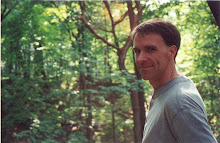[Shaker Square]
This replaced a community of religious folk whose jittery dancing during services earned them the name "Shakers." In the middle of the actual square surrounded by semicircles of brick-fronted shops sits the Shaker mill's stone.  I stopped in at a bookstore. Richard, the man behind the counter, looked like Santa Claus. He had wispy white hair and a big belly beneath a red-and-white checked shirt tucked into baggy jeans. His head tilted down so that he constantly looked over his spectacles at me.
I stopped in at a bookstore. Richard, the man behind the counter, looked like Santa Claus. He had wispy white hair and a big belly beneath a red-and-white checked shirt tucked into baggy jeans. His head tilted down so that he constantly looked over his spectacles at me.
About Hopper's work, he gushed, "I just think he captures the isolation of this country. He saw certain scenes that tug at your heartstrings. And you really get a window onto the country's problems. And he evokes a memory for every single one of us. He represented a situation, where, even though we weren't there, we thought we had been there or we knew where it was. I'll bet you a thousand million people have been in that diner that Hopper painted. You can be 10 years old or 110: you've all seen that window. Human beings, people, stuck in a diner, getting morbid. They may be lonely, in love, or they can't sleep. But they've been in that diner. Whether they were getting some directions; or whether they were lonely, or whether they were lost, whether it was the moon.
"As far as isolation in this neighborhood," he shrugged, "the Community Association was established to try to keep the neighborhood safe and viable. Politicians tried to make it fail, but the association keeps it together. They were established in the sixties when things were tense. They quickly moved to quell the riots that destroyed other parts of town."
A tall, thin woman listening to us exclaimed, "Have you seen it? Cleveland is dead. I mean this is it, the city. The suburbs are Cleveland."
The man working beside Richard, wholesome, fortyish, with thinning hair carving out a widow's peak, offered, "I have one of his paintings in my living room. The one in the Chinese Restaurant [Chop Suey]." 
"Is that the original?" Richard joked, then more seriously added, "My father painted--lighthouses."
"Another favorite Hopper subject," I pointed out.
"Right, sure, and water, and trains. There are such associations with train tracks. During the summer at three o'clock in the morning, I'd wake up and hear a train whistle, the midnight train. And then you'd hear a big sound like this. [He pounded the counter.] It was the brakeman hitting the brakes. Because it had to go around Cleveland, the biggest roundtable from New York to Chicago. All lines connected in Cleveland. Seven o'clock on Saturday night, I'd catch the train into town. At six the next morning, my mother would go to church. The train had me back by five. My father would kill me if he ever knew. The train represented getting away. The train that I left home on for the first time. The train that first resulted in my nostalgia for trains. Said goodbye from that train. I said goodbye to people. I said goodbye, and I took that train."
20090213
153 Cleveland, OH: Shakers and Movers
Subscribe to:
Post Comments (Atom)




No comments:
Post a Comment